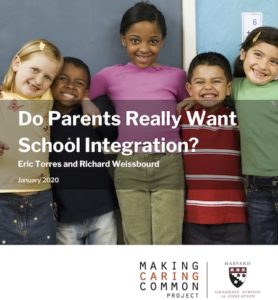 A new report published by the Making Caring Common Project at the Graduate School of Education at Harvard University finds that a large majority of parents across race, class, geographic region, and political affiliation favor substantially racially and economically integrated schools. That’s the good news. The bad news is that when parents have more control over where to send their children to school, their choices make schools more segregated.
A new report published by the Making Caring Common Project at the Graduate School of Education at Harvard University finds that a large majority of parents across race, class, geographic region, and political affiliation favor substantially racially and economically integrated schools. That’s the good news. The bad news is that when parents have more control over where to send their children to school, their choices make schools more segregated.
Researchers conducted a large-scale national survey of U.S. adults and held numerous individual interviews and focus groups with a wide array of Americans to explore whether and how much parents value school integration and the factors that shape their thinking about sending their child to an integrated school. They found that while most parents expressed support for integration, the research also suggested that a complex mixture of concerns about school quality and a variety of unacknowledged racial and class biases may deter many parents from choosing integrated schools for their children.
The results indicate that many White, advantaged parents, for example, appear to make their decisions based on the number of parents like them at a school. Many parents make decisions based on school quality measures, such as test scores, that favor more advantaged school populations and commonly don’t reflect actual educational quality.
“Many parents don’t do the legwork to determine which schools in their district are actually high-quality and might work for their family,” said Eric Torres, a Ph.D. student at Harvard University and co-author of the report. “To get beyond their biases and misperceptions, parents need to actually visit schools, talk to people with education expertise, and get out of their bubbles. Talking to people from other classes and cultures can be particularly valuable.”
The full report – Do Parents Really Want School Integration? – may be downloaded by clicking here.










